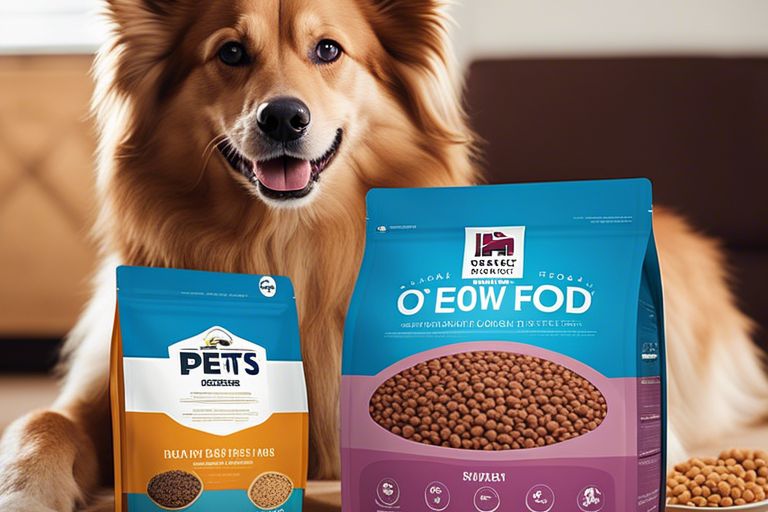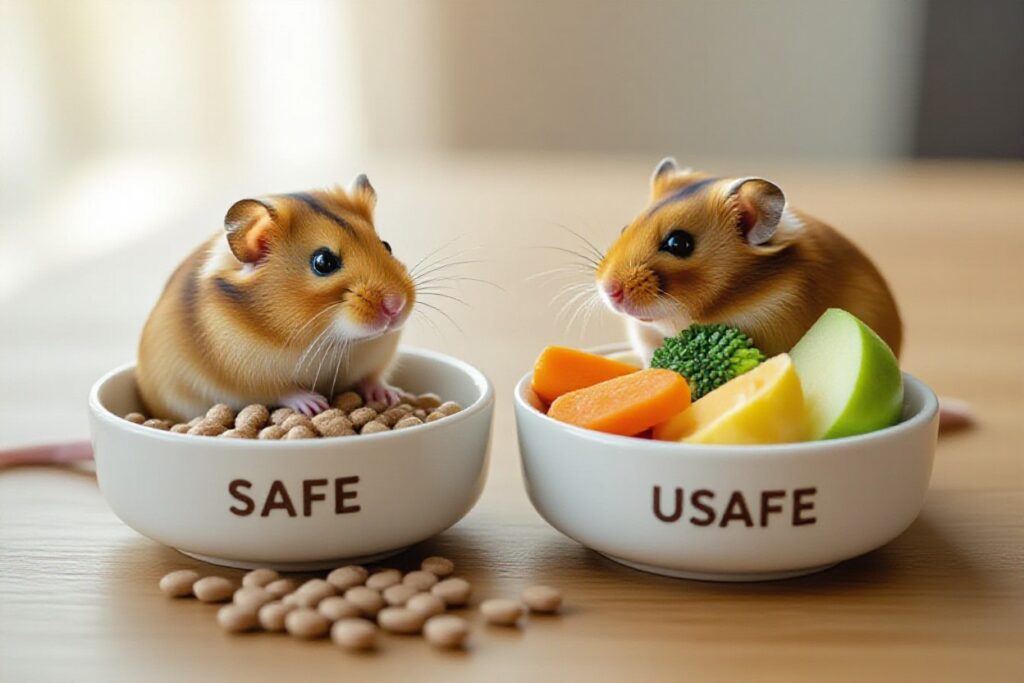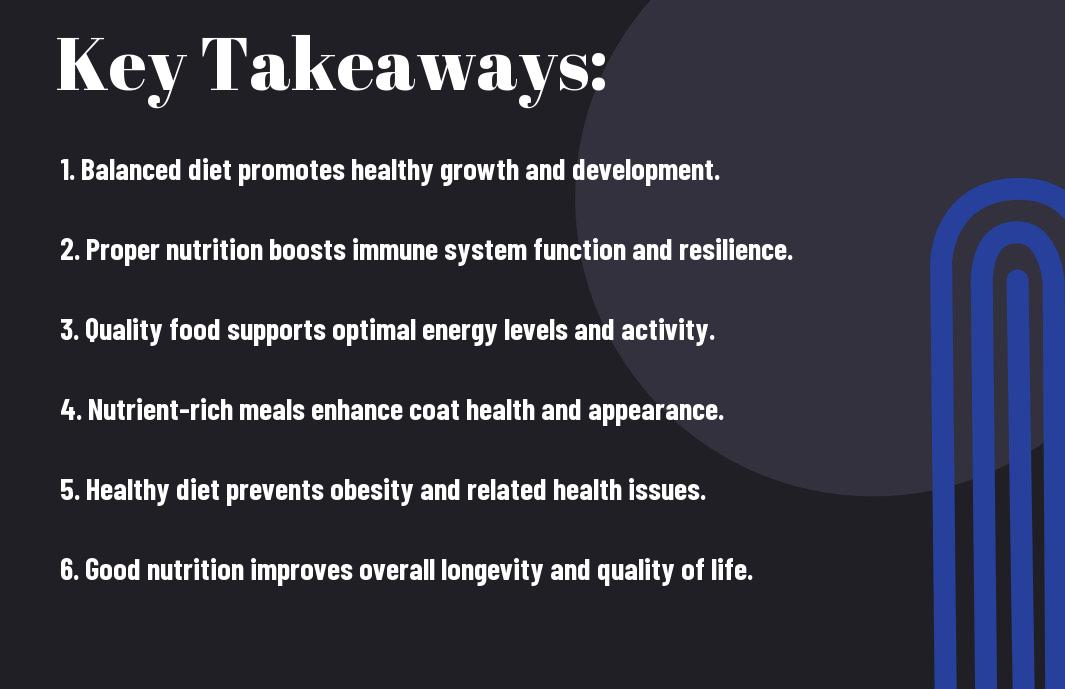Embarking on the journey of providing your furry friend with proper nutrition can be a daunting task, but it is instrumental in maintaining their overall health and well-being. In this informative blog post, we will explore the key components of pet nutrition that support healthy digestion and weight management.
For more insights on pet nutrition, be sure to check out this guest blog post on Pet Nutrition: Key Ingredients for a Healthy Diet for further reading.
Key Takeaways:
- Quality ingredients are essential: Ensure your pet’s food contains high-quality protein, healthy fats, and essential nutrients to support digestive health and weight management.
- Proper portion control is crucial: Overfeeding can lead to weight gain and digestive issues, so it’s important to measure out the correct serving sizes for your pet.
- Provide adequate fiber: Fiber is important for digestive health and can help prevent constipation and other issues. Look for pet foods with added fiber or consider supplementing with vegetables or fruits.
- Avoid fillers and artificial additives: Choose pet foods that are free from fillers, artificial flavors, and preservatives to support a healthy digestive system and overall well-being.
- Regular exercise is key: Alongside a balanced diet, regular physical activity is essential for weight management and overall health. Engage in activities that your pet enjoys, such as walks, runs, or play sessions.
- Consult with a veterinarian: If you have concerns about your pet’s digestive health or weight, it’s important to seek guidance from a qualified veterinarian who can provide personalized recommendations.
- Monitor your pet’s progress: Keep track of your pet’s weight, energy levels, and overall well-being to ensure that their diet and exercise routine are supporting their digestive health and weight management goals.
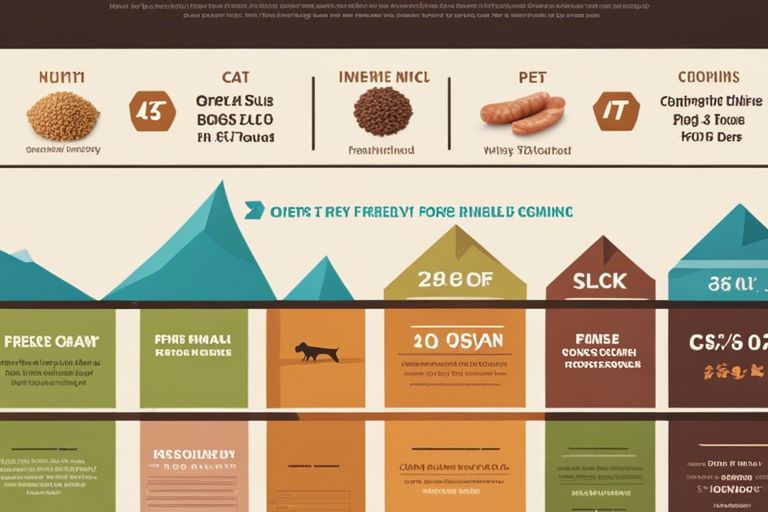
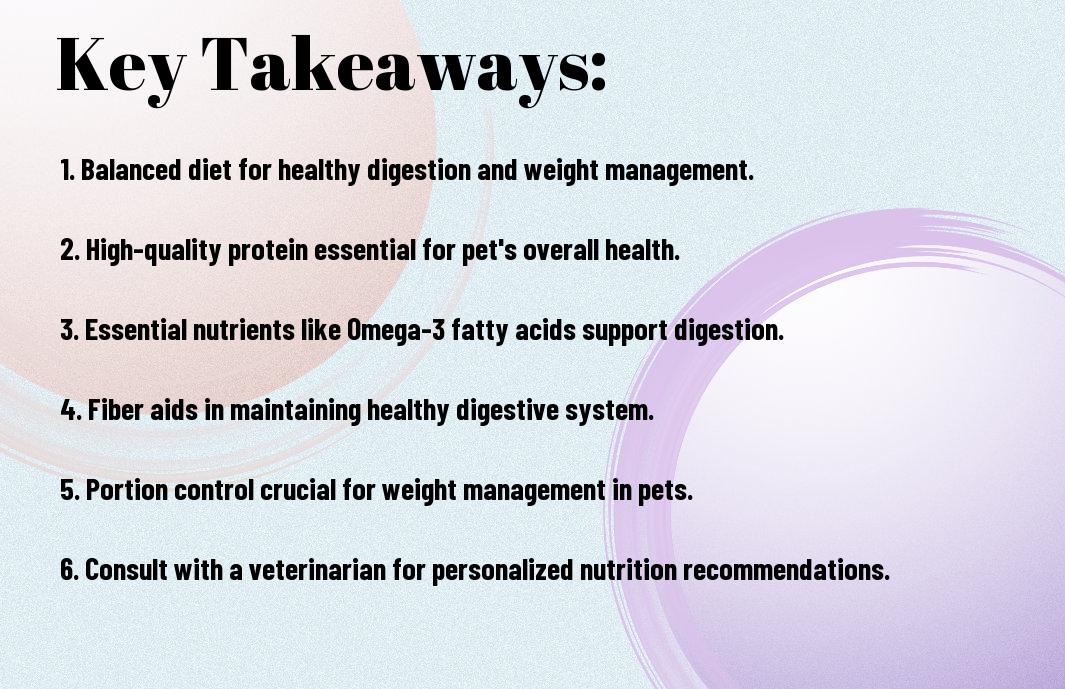
Understanding Pet Nutrition Basics
Obviously, providing proper nutrition for your pet is crucial for maintaining their overall health and wellbeing. This includes supporting healthy digestion and weight management. To help you better understand the basics of pet nutrition, we have gathered some essential information to guide you in making informed decisions for your furry friend. Check out these 5 Tips to Better Dog Weight, Diet, and Digestive Health.
Macronutrients: Proteins, Carbohydrates, and Fats
On a fundamental level, pet nutrition revolves around macronutrients such as proteins, carbohydrates, and fats. These are the building blocks of a balanced diet for your pet. Proteins help in muscle development and repair, carbohydrates provide energy, and fats aid in nutrient absorption and support cell function.
It’s important to understand the role of each macronutrient and to ensure that your pet’s diet includes the right balance of these essential components for their overall health and vitality.
Micronutrients: Vitamins and Minerals
Basics for proper pet nutrition also include micronutrients such as vitamins and minerals. These are essential for supporting various bodily functions, including immune system health, bone strength, and overall vitality. With vitamins like A, B, C, D, and minerals such as calcium, iron, and potassium, your pet can maintain optimal health and wellness.
With a proper understanding of the importance of micronutrients, you can ensure that your pet’s diet is rich in these essential vitamins and minerals, supporting their overall health and well-being.
The Role of Water in Pet Health
Minerals in water play a vital role in supporting the overall health of your pet. Ensuring that your furry friend has access to clean and fresh water at all times is crucial for their hydration and overall well-being. Proper hydration supports organ function, digestion, and nutrient absorption, making it essential for a healthy and happy pet.
Fats play a crucial role in the absorption of certain micronutrients, making them essential for your pet’s overall health and well-being. Including healthy fats in your pet’s diet can help support their immune system, maintain a healthy coat, and aid in overall nutrient absorption, ensuring they stay happy and healthy.
Assessing Your Pet’s Dietary Needs
To ensure that your pet receives the proper nutrition, it is important to assess their specific dietary needs. This involves considering factors such as their age, weight, activity level, and any underlying health conditions.
Factors Influencing Nutritional Requirements
When assessing your pet’s dietary needs, it is crucial to take into account various factors that can influence their nutritional requirements. These factors include their age, breed, size, activity level, and any existing health issues. For example, a senior dog may have different nutritional needs compared to a puppy, and a highly active dog may require more protein and energy-dense food compared to a sedentary pet. Additionally, certain health conditions such as allergies or digestive issues may require a specialized diet.
- Age
- Breed
- Size
- Activity Level
- Health Conditions
Perceiving these factors is essential in determining the right balance of nutrients for your pet’s specific needs.
How to Read Pet Food Labels
With the wide variety of pet food options available, it is important to know how to interpret the information provided on pet food labels. By understanding the ingredients, guaranteed analysis, and feeding guidelines, pet owners can make informed decisions about the best food for their pets.
This involves taking into consideration all the factors that influence your pet’s nutritional requirements and finding a pet food that aligns with those needs.
Special Considerations for Different Life Stages
Life stage is a critical factor to consider when determining your pet’s nutritional needs. Puppies and kittens have different requirements than adult or senior pets. Growth, development, and maintenance all play a role in what a pet should be fed at different stages of life.
Your pet’s life stage will dictate the type and amount of nutrients they need to support their health and well-being throughout their lifetime.
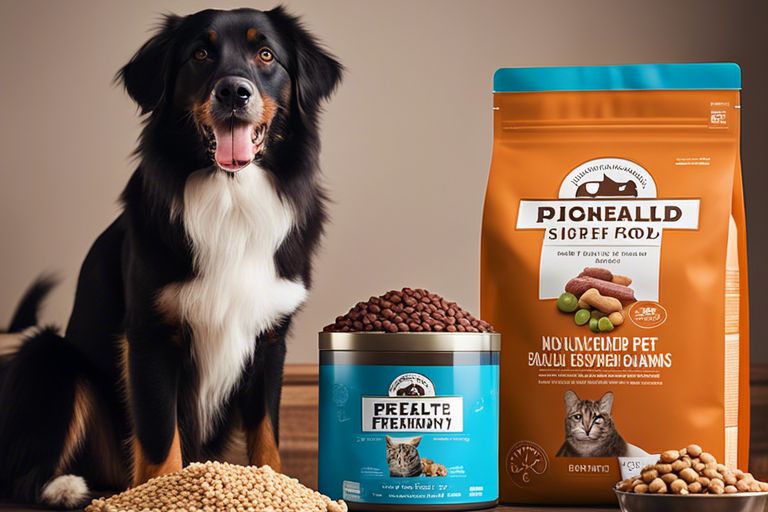
The Impact of Diet on Digestive Health
Unlike humans, pets are unable to make informed choices about their diet, and rely solely on their owners to provide them with the necessary nutrients to support their digestive health. The impact of diet on digestive health in pets is a crucial consideration for pet owners, as poor nutrition can lead to a host of digestive issues and related health problems.
Common Digestive Issues in Pets
Issues such as diarrhea, constipation, and vomiting are all common digestive problems that can arise in pets due to poor diet choices. These issues can be uncomfortable for pets and can have a significant impact on their overall health and well-being. It is important for pet owners to be aware of the potential consequences of feeding their pets an improper diet and take steps to address any digestive issues that may arise.
Probiotics and Prebiotics: Supporting a Healthy Gut
Health of the digestive system is greatly influenced by the balance of beneficial bacteria in the gut. Probiotics and prebiotics play a crucial role in supporting a healthy gut by promoting the growth of beneficial bacteria and maintaining a balanced microbial environment. Incorporating these supplements into your pet’s diet can greatly improve their digestive health and overall well-being.
Impact of probiotics and prebiotics on the digestive system, Common digestive issues in pets, proper pet nutrition, supporting healthy digestion and weight management.
Foods to Promote Digestive Health
Common foods such as pumpkin, yogurt, and bone broth are known for their ability to promote digestive health in pets. These foods contain beneficial nutrients and properties that can aid in digestion, alleviate digestive issues, and support a healthy gut. Including these foods in your pet’s diet can help to improve their digestive health and ensure they maintain a healthy weight.
Pets, proper pet nutrition, supporting healthy digestion, digestive issues, probiotics, prebiotics, weight management.
Strategies for Weight Management
Keep your pet at a healthy weight is essential for their overall well-being. Good nutrition and regular exercise are the cornerstones of proper weight management for your furry friend. Here are some key strategies to help keep your pet at a healthy weight.
Recognizing Overweight and Obesity in Pets
Strategies for managing your pet’s weight start with recognizing the signs of overweight and obesity. This can include excessive weight gain, difficulty feeling their ribs, and lethargy. If you notice any of these signs, it may be time to talk to your veterinarian about a weight management plan.
Caloric Needs and Portion Control
Control your pet’s caloric intake by feeding them the appropriate portion sizes for their size and activity level. Plus, consider incorporating weight management pet foods that are specially formulated to support a healthy weight and digestion.
Plus, regular exercise is an important component of weight management for pets. By engaging in daily physical activity, your pet can burn extra calories and maintain a healthy weight. It’s essential to find activities that your pet enjoys, such as walking, playing fetch, or interactive play sessions. It may also be beneficial to consult with your veterinarian to determine the appropriate level of exercise for your pet’s specific needs.
The Role of Exercise in Weight Management
Control your pet’s caloric intake by feeding them the appropriate portion sizes for their size and activity level. Plus, consider incorporating weight management pet foods that are specially formulated to support a healthy weight and digestion.
It’s important to note that exercise not only helps with weight management but also provides mental stimulation and promotes overall well-being for your pet. Regular exercise can also strengthen the bond between you and your furry friend, making it a win-win for both of you.

Homemade Diets and Raw Feeding
Not all pet owners opt for commercial pet food for their furry friends. Some choose to create homemade diets or feed raw food to their pets. While these options can offer benefits, they also come with their own set of risks and considerations.
Benefits and Risks of Homemade Diets
Feeding your pet a homemade diet can allow for more control over the ingredients and quality of food they consume. This can be especially beneficial for pets with allergies or sensitivities to certain ingredients. However, it can be challenging to ensure that homemade diets provide all the necessary nutrients for optimal pet health. Without proper veterinary guidance, pets may miss out on essential vitamins and minerals, leading to deficiencies.
The Raw Food Debate
An ongoing debate surrounds the practice of feeding raw food to pets. Proponents argue that a raw food diet more closely resembles what animals would eat in the wild, and therefore is more natural and beneficial for them. Critics raise concerns about the potential for bacterial contamination in raw meat, as well as the risk of pets choking on bones.
It is important to thoroughly research and consider the potential risks and benefits of raw feeding before adopting this diet for your pet. Consult with a veterinarian to fully understand the implications and ensure your pet’s health and safety.
Safe Food Handling Practices
Food safety is crucial when preparing homemade diets or feeding raw food to pets. Ensure that all ingredients are fresh, clean, and stored properly to prevent contamination. Thoroughly clean and sanitize all surfaces and utensils used in food preparation to avoid the spread of harmful bacteria. Additionally, always wash your hands before and after handling pet food.
Homemade diets and raw feeding can be beneficial for some pets, but it is important to follow safe food handling practices to minimize the risk of foodborne illness for both you and your pet. Implementing these practices will help ensure that your pet’s homemade diet or raw food is as safe and nutritious as possible.
Dietary Supplements and Additives
For a holistic approach to pet nutrition, dietary supplements and additives play a crucial role in supporting healthy digestion and weight management. Whether it’s probiotics for gut health or omega-3 fatty acids for a lustrous coat, these additions can provide numerous benefits to your pet’s overall well-being.
When Supplements Are Necessary
When your pet has a specific health condition or dietary requirement, supplements may be necessary to fill the nutritional gap. For example, older pets or those with digestive issues may benefit from digestive enzymes to aid in nutrient absorption. It’s important to consult with a veterinarian before adding any supplements to your pet’s diet to ensure they are the right choice for their individual needs.
Common Supplements for Digestive Support
One of the common supplements for digestive support is probiotics, which promote a healthy balance of gut bacteria and aid in the breakdown of food. Additionally, prebiotics can serve as fuel for beneficial bacteria, further supporting digestive health. These supplements can be particularly beneficial for pets transitioning to a new diet or experiencing gastrointestinal upset.
A high-quality digestive supplement can also contain ingredients such as fiber, which assists in regulating bowel movements and preventing constipation. When choosing a supplement for digestive support, seek out those with natural and easily digestible components to ensure effectiveness.
Evaluating the Efficacy and Safety of Additives
The efficacy and safety of additives, including dietary supplements, can vary significantly. It’s essential to thoroughly research and select supplements that are backed by scientific evidence and have a proven track record of safety and efficacy. Look for products that have undergone quality testing and are produced by reputable manufacturers to ensure the health and well-being of your pet.
Digestive health is a critical aspect of your pet’s overall wellness, making it vital to prioritize the safety and efficacy of any additives you introduce into their diet. By choosing carefully and consulting with your veterinarian, you can ensure that the supplements you provide support healthy digestion and weight management for your pet.
Challenges and Solutions in Pet Nutrition
Despite our best efforts to provide our pets with a balanced diet, there are several challenges that pet owners may encounter when it comes to pet nutrition. These challenges can range from picky eaters to food allergies and intolerances, as well as specific health conditions that may require a tailored diet. Understanding these challenges and finding effective solutions is crucial in supporting our pets’ overall health and well-being.
Managing Picky Eaters
To ensure that your pet is receiving proper nutrition, it is important to address picky eating habits. This can be achieved by introducing variety in their diet, offering different textures and flavors, and establishing a consistent feeding schedule. Another effective solution is to consult with a veterinarian or animal nutritionist who can provide guidance on how to address picky eating habits and ensure that your pet is receiving the necessary nutrients.
Coping with Food Allergies and Intolerances
Any pet owner may encounter the challenge of dealing with food allergies or intolerances in their furry companions. For instance, some pets may develop allergic reactions to common ingredients such as grains, dairy, or certain proteins. To address this, it is essential to identify and eliminate the specific allergens from their diet, and instead, opt for hypoallergenic or limited ingredient diets that are formulated to minimize allergic reactions. Consultation with a veterinarian is crucial in determining the best approach to manage food allergies and intolerances in pets, ensuring that they receive proper nutrition without triggering adverse reactions.
Addressing Specific Health Conditions Through Diet
On certain occasions, pets may develop specific health conditions that can be managed through a tailored diet. This may include conditions such as obesity, diabetes, kidney disease, or digestive issues. Coping with these health conditions through diet involves formulating a nutrition plan that supports weight management, regulates blood sugar levels, reduces kidney stress, or promotes digestive health. Working closely with a veterinarian or animal nutritionist is essential in developing a customized diet plan that addresses the specific health needs of your pet.
Coping with these challenges in pet nutrition requires a proactive approach and a deep understanding of the individual needs of each pet. By addressing picky eating habits, managing food allergies and intolerances, and tailoring diets to specific health conditions, pet owners can support their pets’ overall health and well-being.
Proper Pet Nutrition – Supporting Healthy Digestion And Weight Management
To wrap up, proper pet nutrition is essential for supporting healthy digestion and weight management in our furry friends. By providing a balanced diet that includes high-quality ingredients and essential nutrients, pet owners can help their pets maintain a healthy weight and promote optimal digestion. Incorporating natural fibers and probiotics into their diet can also support a healthy gut microbiome and aid in proper digestion. Additionally, portion control and regular exercise play key roles in helping pets maintain a healthy weight, reducing the risk of obesity-related health issues.
As responsible pet owners, it is important to prioritize proper nutrition for our pets, as it directly impacts their overall health and well-being. By working closely with veterinarians and pet nutrition experts, we can ensure that our pets receive the best possible diet and support for healthy digestion and weight management. With the right knowledge and resources, we can make informed decisions about our pets’ nutrition and take proactive steps to support their overall health and wellness.
Proper Pet Nutrition – Supporting Healthy Digestion And Weight Management
Q: Why is proper pet nutrition important for supporting healthy digestion and weight management?
A: Proper nutrition is crucial for maintaining your pet’s overall health and well-being. It supports healthy digestion, which in turn promotes good weight management, leading to a longer and happier life for your pet.
Q: What should I look for in a pet food to support healthy digestion and weight management?
A: Look for pet foods that contain high-quality protein sources, fiber for digestive health, and essential nutrients such as omega-3 fatty acids. Avoid foods with excessive fillers, artificial flavors, and preservatives.
Q: How can I tell if my pet is overweight or has digestive issues?
A: Look for signs such as excessive weight gain, lethargy, digestive upset, and changes in bathroom habits. It’s important to consult with a veterinarian for a proper assessment and diagnosis.
Q: Are there specific ingredients I should avoid in pet food for healthy digestion and weight management?
A: Yes, avoid foods with excessive amounts of corn, wheat, soy, and artificial additives. These ingredients can cause digestive issues and contribute to weight gain in pets.
Q: Should I consider a special diet or prescription food for my pet’s digestive and weight issues?
A: Depending on the severity of the issues, your veterinarian might recommend a special diet or prescription food tailored to your pet’s specific needs. These diets are formulated to support digestive health and weight management.
Q: How can I help my pet maintain a healthy weight and digestion outside of choosing the right pet food?
A: Regular exercise and portion control are key factors in helping your pet maintain a healthy weight. Additionally, providing opportunities for mental stimulation can also contribute to good digestion and weight management.
Q: What are some common misconceptions about pet nutrition and weight management?
A: One common misconception is that all pet foods labeled as “natural” or “organic” are healthier. It’s important to carefully read ingredient labels and consult with a veterinarian to determine the best options for your pet’s specific needs.
